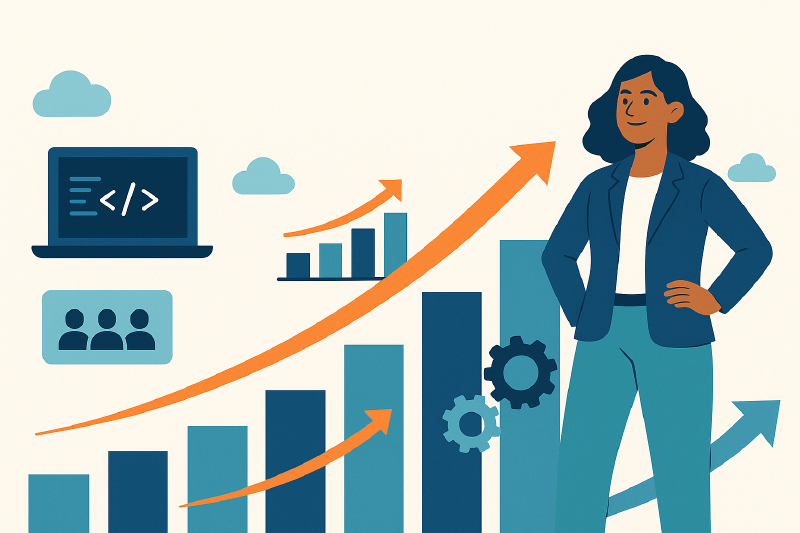Today marks my seventh anniversary at Relias, a milestone that feels both surreal and significant. This is officially the longest I’ve stayed with any employer, and the longest I’ve committed to any single career path. Before joining Relias, I spent six years as a speech-language pathologist before taking the leap into software engineering through a coding bootcamp. Looking back at the person I was seven years ago, I’m not sure she would recognize the professional she’s become—though perhaps some core elements would feel familiar.
The Journey of Growth and Gratitude
These seven years have been filled with tremendous growth, and distilling that evolution into just three key takeaways proved challenging. My learning has been rapid, consistent, and wonderfully varied. I’ve been fortunate to have incredible mentors throughout this journey—from the developers on my first team who taught me what it truly means to be a software engineer and how to navigate our codebase, to the leadership mentors who helped me identify my strengths and step confidently into my role as a leader, to my colleagues who taught me the nuances of engineering management, how to develop team members effectively, and the principles of servant leadership. Thank you to each and every person who has invested in my growth and shaped the professional I am today.
Lesson One: Embracing Your Technical Identity
I AM a technical person. For those who’ve followed my writing, you might be tired of hearing about my confidence struggles. But this realization is foundational, and it’s something I still navigate daily. The questions persist: Am I strong enough as a player-coach? Am I “technical enough” to continue advancing in this field?
The answer, definitively, is yes.
Seven years ago, I joined Relias with just enough React and SQL knowledge to be dangerous. Today, I’m partnering with my team to modernize our integrations solution. I’m coaching team members on leveraging GitHub Copilot to troubleshoot configuration issues and get new services running. I’m mentoring emerging leaders across the company about what engineering means at Relias and how our technical systems work.
The evidence is clear. It’s time to own this identity and stop questioning it.
Lesson Two: The Power of Doing Hard Things
I can do hard things. (Thank you, Ms. Rachel, for this mantra!)
Like many millennials, I grew up being labeled “gifted” and “smart.” The unintended consequence? Whenever I encountered something challenging—something that threatened that identity—I ran. If I failed, did that mean I wasn’t gifted anymore? I avoided the discomfort of not immediately excelling or achieving perfection, whether it was learning to rock climb or tackling complex projects.
Then I entered software engineering, where everything was hard.
Coding doesn’t come naturally to me the way it might for others. I’ve had to work exceptionally hard to achieve even middle-of-the-road results. Initially, this reinforced my feelings of being “not technical enough” and prevented me from pursuing opportunities that could have accelerated my growth.
But here’s what I’ve learned: the space of discomfort is where growth happens. I will see the other side. It might not be perfect. I might not get it right the first time. And that’s completely okay.
Lesson Three: Know Thyself, Trust Thyself
Know thyself. I understand my value now. I recognize my strengths. I’ve learned not to let doubts—whether internal or external—prevent me from pursuing what I know I can excel at.
The times I’ve questioned my value or doubted my capabilities have stalled my growth and potentially led to missed opportunities. Staying grounded in self-knowledge keeps me on the path I’m meant to follow. This self-awareness isn’t about arrogance; it’s about having the confidence to advocate for yourself and make career decisions aligned with your authentic strengths.
Moving Forward with Confidence
These seven years at Relias have taught me that career growth isn’t linear, and transformation often happens in the spaces that feel most uncomfortable. Whether you’re considering a career transition, struggling with imposter syndrome, or questioning your technical capabilities, remember: you are more capable than you think, hard things become possible with persistence, and knowing yourself is your greatest professional asset.
What’s your career transformation story? Have you experienced similar challenges with technical confidence or imposter syndrome? I’d love to hear about your journey in the comments below. Let’s continue learning and growing together.
Are you navigating a career transition in tech or struggling with similar confidence challenges? Connect with me on LinkedIn to continue the conversation and share insights from your own professional journey.
